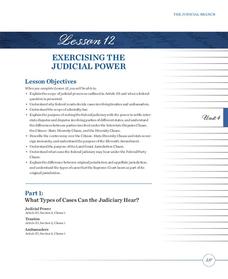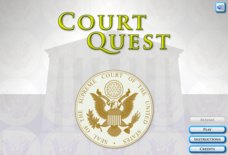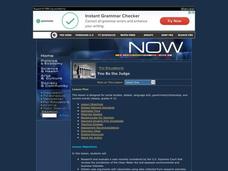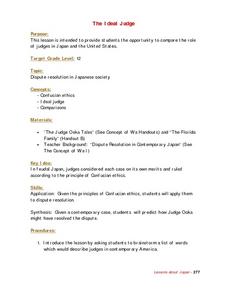Judicial Learning Center
The Judge and the Jury: Trial by Jury
Why is it so important to have a trial by jury in the American judicial system? This right is one of the hallmarks of American democracy, but it also comes with the responsibility of serving on a jury if called. Young legal scholars...
Judicial Learning Center
Judicial Independence: What’s Wrong with This Court?
Why is it important for judges to operate independently of politics or other branches of government? Scholars ponder the question as they examine video clips, case studies, excerpts of the US Constitution, and an interactive computer...
Judicial Learning Center
About Federal Judges: Qualifications of Judges
"Help Wanted: A Supreme Court Justice." What should be included in the ad? Learners ponder the question during a lively activity that asks them to examine the qualifications for various federal offices and then create job postings....
iCivics
Mini Lesson: Judicial Activism and Restraint
Scholars analyze the United States judicial branch as it pertains to activism and restraint. They use research to define the roles the courts play while at the same time investigate current events to identify how the media covers those...
Judicial Learning Center
How to Create a Law
Laws affect everything from a scholar's favorite public park to rules in the classroom. Express the importance of lawmaking and teach how they relate to every facet of life with a resource on how a bill becomes a law.
Judicial Learning Center
The Federalist Papers and The Federal Judiciary
Pupils work in groups or as individuals to read about and then discuss the Federalist Papers. To finish, they write essays about an assigned topic dealing with the Federalist Papers and the federal judiciary.
University of Pennsylvania
Mock Trial of Alfred Dreyfus
What if scholars based mock trials on history? The fourth installment of a five-part series on the Dreyfus Affair asks learners to read various pieces of evidence before conducting a mock trial for a French officer. Teams answer...
iCivics
Governing Communities
The government at the local level acts as perhaps one of the most relevant government systems to many in their communities. Learners discover how the local government shapes their lives and the similarities and differences between the...
Ohio Center For Law-Related Education
Four Activities: Thurgood Marshall and the Nomination and Confirmation of Federal Judges
The process of nominating and confirming federal judges can sound like a lot of bureaucratic hoops, but a resource breaks down the steps of the Supreme Court nominations in a simpler manner. Learners participate in four activities that...
Heritage Foundation
Exercising Judicial Power
We should all do more exercising, but should the judicial branch as well? High schoolers develop their understanding of what powers the judicial branch carries because of the US Constitution, as well as where their limits lie in the...
American Bar Association
What Is Separation of Powers?
Who has the power? Scholars investigate the creation of the three branches of government in the United States Constitution. They analyze just why the framers created the branches the way they did.
iCivics
Court Quest
Introduce your learners to the federal and state court systems with a fun, interactive online video game! After reading sample cases, class members identify to which court the case should be assigned and gain a greater understanding...
Curated OER
From Classroom to Courtroom: The Children of Supreme Court Justices
Students choose one of the Supreme Court justices and research their life as a child from birth to age 21. They identify a list of topics that related specifically to youth that this judge may have a vested interest in.
Curated OER
Mock Appellate Arguments
Students participate in a mock appellate argument by role playing a case. They develop a case and present it to the judge using proper argument techniques.
Curated OER
Making an Appeal
Learners make an appeal. In this making an appeal lesson students give characteristics of the Washington Supreme Court. Learners examine public policy conflicts and present an appellate case.
Curated OER
You Be the Judge
Students research and evaluate a case considered by the U.S. Supreme Court regarding the jurisdiction of the Clean Water Act. They watch a Bill Moyers video, conduct a debate, and write about the decision they would make if they were a...
Curated OER
Executive Decisions
Young scholars explore the role of judges in Britain. For this current events lesson, students visit selected websites to discover the responsibilities of judges and the justice reform in Britain.
Curated OER
What Makes a Good Judge?
Students define qualities that should be considered when selecting judge, evaluate costs and benefits of two methods of selecting and retaining judges, decide whether methods provide for judicial independence
and judicial accountability,...
Curated OER
The Ideal Judge
Twelfth graders compare and contrast judges in Japan and United States, read cases from "The Judge Ooka Tales," apply principles of Confucian ethics to dispute resolution, and predict how Japanese judge would rule in contemporary case.
Curated OER
Rights and Responsibilities
Learners examine the concepts of dual responsibilities and rights. They read three cases, identify the rights and responsibilities, and arrive at verdicts.
Curated OER
The Trial Process
Students explore the trial process as a guest speaker visits the classroom.
Curated OER
Unfair Or Deceptive Sales Practices
Students explore fair and unfair practices in the judicial system. They are to find sources in their own community to find help for a problem.
Curated OER
Kids in the Classroom on Summit Day
Students discuss the qualifications of a Supreme Court justice. As a class, they role play the role of a justice and share with the class why they are the best qualified candidate for the job. In groups, they create a bumper sticker or...

























